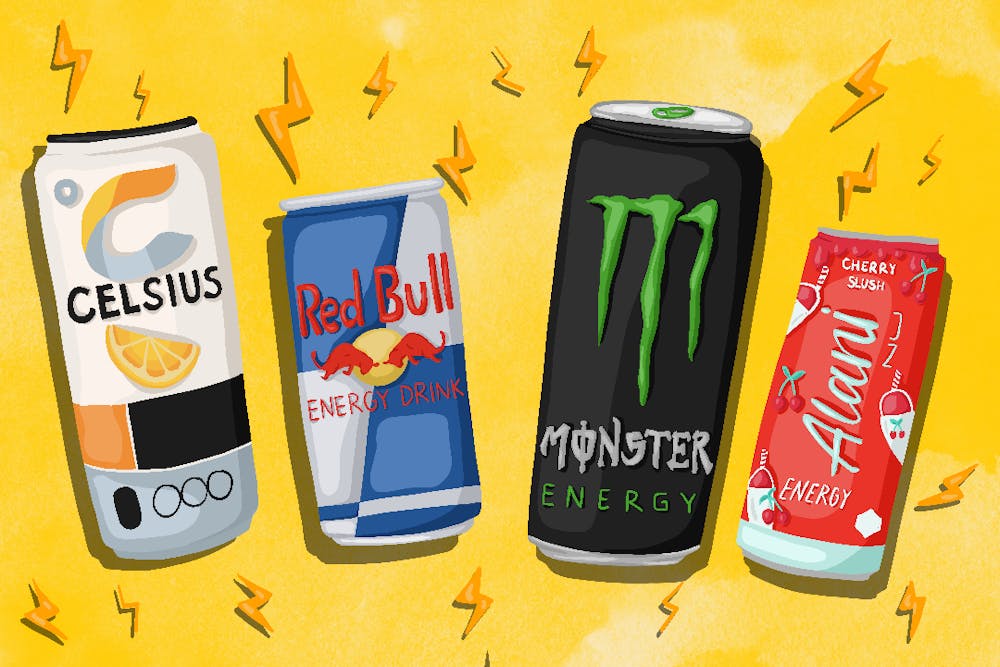Whether it's a cup of coffee, a shiny, sugar-free Red Bull or one of those radioactive neon cans whose name is ever-changing, ASU students rely on caffeinated drinks to stay awake and complete their tasks by deadline. In the rush of midterms, internships, late-night study sessions, and part- or full-time jobs, students may find themselves with no other option when combating exhaustion.
Niaomi Doherty, a freshman studying community health, is one such student who depends on caffeine to get through her day.
"It's either fall asleep and fall behind and maybe mess up one of your classes, or take the drink and get it done, push through," said Doherty of her own caffeinated study nights.
This push-through attitude is ubiquitous on campus, found in the faces of many students trudging toward an early morning class or taking up residence in a study room. Big things are on the line, such as maintaining GPAs, keeping scholarships and impressing future employers.
Sometimes the only thing standing between a student and a submitted essay is that energy drink. Energy drink consumption is so engrained in college life that student marketeers can often be found on campus handing out free cans. According to Doherty, Red Bull cans were even distributed at TaylorFest at the beginning of the year on the Downtown Phoenix campus.
This kind of marketing and advertising is generally welcomed by students, though some still hold reservations about what’s being peddled to them.
"I think it's nice to give free energy drinks," social work graduate student Brooke Schapiro said in a written statement. "I feel like college students typically need it. But it depends what kind (and) what they are made of."
Schapiro expressed the health concerns she has surrounding energy drinks, leaning into the possible negative health outcomes that can accompany their ingredients, including the high sugar and caffeine content.
"I think they (hold a) more negative (connotation) for me," said Schapiro. "I use them because I don't always want coffee, but I have concerns with the ingredients overall."
Schapiro was not alone in holding a conflicted relationship with caffeine. Doherty referred to her own negative experience with using caffeinated beverages when attempting to stay awake to complete her assignments.
"I did attempt to pull an all-nighter, and I did, and I had maybe two cups of coffee or Red Bulls. I couldn't even stay awake for my test. I was jittering and shaking," Doherty said.
The pressures and responsibilities associated with a college curriculum and lifestyle are ever-evolving, often resulting in increased caffeine consumption to keep up.
READ MORE: A 'tall order': The guide to coffee shops in Tempe and downtown Phoenix
"I believe the commitment and need for energy (and) concentration has definitely impacted my (caffeine intake)," Schapiro said in a written statement. "I work two jobs on top of an internship (and) school, so it's non-stop work."
Energy drinks have become synonymous with the college student lifestyle, a tool of the trade in higher education. ASU is aware of the dynamic at play between students and caffeine, providing an informational page about the impact of caffeine on students' health and well-being. The website provides insight into healthy amounts of caffeine, side effects and more.
ASU Clinical Professor Kathleen Dixon, who teaches food science and nutrition courses, emphasized to consumers the importance of knowing what they're consuming.
"Be a good label reader," said Dixon. "Be cognizant of labels and what you’re consuming.”
Dixon elaborated on this notion when discussing the risk factors involved in energy drink consumption. According to Dixon, caffeine can affect people differently due to their particular risk factors such as family history or heart disease, but balance is key for these often stigmatized drinks.
These fears surrounding highly caffeinated drinks were mirrored in the sentiments expressed by students, despite their continued caffeine use.
Students and faculty alike appear to hold similar reservations about these sugary drinks. While seen as a necessary tool in late-night cram sessions and early morning classes, moderate consumption is key, according to Dixon.
"A balanced approach is important," she said. "We shouldn't vilify anything."
Edited by Katrina Michalak, Sadie Buggle and Caera Learmonth.
Reach the reporter at aboulang@asu.edu.
Like The State Press on Facebook and follow @statepress on X.




